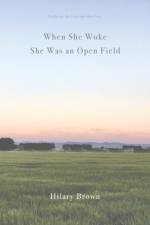av Brown Hilary Brown
147
*Finalist for the Charlotte Mew Prize These poems have an incredibly beautiful and painful landscape. The body becomes the field splayed open, as does memory, as does love, as does language. The imagery of the body is sensual and electric and you can feel the speaker risking so much as they turn from one line to another.>Hillary Brown's When She Woke She Was an Open Field are poems written on the surface of the body to be felt in the reverberations of our bones. They are necessary poems written in these times to remind us of our humanity. This is the perilous work of poetry. They are not easy to read and even more difficult to write. These are poems of unflinching bravery, full of complications and difficult truths.>"Remember your landmarks," writes Hilary Brown, whose poems are at once lyric imperatives and stirring invocations, all of them asking us to reckon with the body of our landscape and vice versa. When She Woke She Was an Open Field arrives with a fresh and clear voice that invites its reader to remember they are always already a viewer, a visitor, a voyeur, too. Brown writes the best kind of short poem-careful in its lyricism and reckless with imagistic surprise-& this collection is nothing if not a memorable landmark.>"Cleave" means both to cut something in half and to hold fast to a body or object we hold dear. Hillary Brown's poems investigate the remade female self after brain surgery: an operation that cleaves her vision of herself and the world, but also allows her to imagine a self more fully cleaved to the world she inhabits, where the tongue becomes a "prickly pear/ blossom open/ for rain," and any anonymous young woman can still "be fearless, full to bursting, free.">Hilary Brown is one of those poets who doesn't look away. Who invites you to stare and meets your eyes with her own always steady gaze-even when the world is unsteady, full of loss and all the slow death capitalism has on offer. These poems provide something else, aching bright and sharp. They sing the queer body, the disabled body. They know about not having enough to eat, about country roads, about church and how to live through it. These poems know, most of all, "There's power in there, holding / the discomfort of it close."-Stephanie Young

